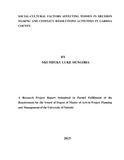| dc.description.abstract | Politics is about development, decision making and sharing the country’s resources. However, politics in Kenya is a male domain that women have found unwelcoming. To most women, it is hostile and dangerous for them to participate in. Societies in which traditional or patriarchal values remain strong may discourage women from entering politics. The objective of this study was to investigate the socio-cultural factors that affect or limit women’s participation in decision making and conflict resolutions.
The study investigated the socio-cultural practices that have hampered women’s progress in achieving their position in leadership, decision making as well as in conflict resolutions.
Though there are other factors that affect women participation in decision making and conflict resolutions, social cultural factors remain the key issue. The purpose of the study was to investigate the factors influencing women participation in decision making and conflict resolutions. Special reference was made to Garissa County. Several research questions were formulated to guide the study. The target population consisted of 100 respondents. Data was gathered by use of questionnaire and was analyzed using qualitative and quantitative data.
The findings revealed that socio-cultural factors have a lot of influence on women’s
participation in decision making and conflict resolutions. Women usually consulted their male relatives since they felt that leadership role was a reserve for men in the society. The study also revealed that the society expected men to take decision making role and conflict resolutions with women only being left as spectators. This is because the community’s culture had a role to play in allocating gender role. A traditionally ascribed role; that is in terms of gender, determines women’s careers and progress.
The study identifies a general change of attitudes in the persistence retrogressive cultural practices. Men are slowly accepting women leadership and their participation in community development. The study also identifies some cultures among the Somali community that completely prohibit women from participating in public matters. It is noted that the Somali culture restricted females to do those work that involve family members only. The findings also revealed that women access to information is limited by strict cultural observation. Finally, based on the findings, it was recommended that the various socio-cultural factors affecting women’s participations in decision making, and conflict resolutions should be abandoned. Thus based on the findings of the study, the researcher recommends that in order to improve women participation in community activities, the society should soften it stand on the patriarchy system to accommodate women leadership. Female Genital Mutilation, which is rampant with the Somali community, should be criminalized and those promoting arrested and punished.
The researcher also recommends that the community be capacity built in order to differentiate between cultural practices and Islamic religion. On its part, Islam is very accommodating to women leadership. However, majority of the Somali community mix their culture, which is oppressive to women, with religion, thus restricting their freedom. | en |

